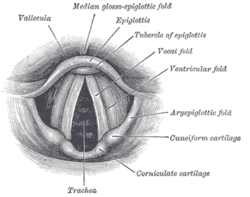Aryepiglottic fold
| Aryepiglottic fold | |
|---|---|
 The entrance to the larynx, viewed from behind (aryepiglottic fold labeled at center right) | |
 Laryngoscopic view of interior of larynx (aryepiglottic fold labeled at center right) | |
| Details | |
| Identifiers | |
| Latin | Plica aryepiglottica |
| TA | A06.2.09.003 |
| FMA | 55448 |
Aryepiglottic fold is a triangular opening at the entrance of the larynx that is narrow in front, wide behind, and sloping obliquely downward and backward. It is bound, in front, by the epiglottis; behind, by the apices of the arytenoid cartilages, the corniculate cartilages, and the interarytenoid notch; and on either side, by a fold of mucous membrane, enclosing ligamentous and muscular fibers, stretched between the side of the epiglottis and the apex of the arytenoid cartilage; this is the aryepiglottic fold, on the posterior part of the margin of which the cuneiform cartilage forms a more or less distinct whitish prominence, the cuneiform tubercle. These folds form the upper borders of the quadrangular membrane. The aryepiglottic folds are shortened in laryngomalacia.
Phonatory mechanism
Under certain circumstances, the aryepiglottic folds take part in phonation, for instance in the singing technique of vocal growl, such as practiced by Louis Armstrong and other jazz singers. It has been proven that the approximation of the aryepiglottic folds during vocalization may establish sustained co-oscillations, at relatively low frequencies, producing the growl or growling effect.[1]
Additional Images
-
Aryepiglottic fold
-
Aryepiglottic fold
-
Aryepiglottic fold
-
Aryepiglottic fold
-
Deep dissection of larynx, pharynx and tongue seen from behind
References
- ↑ Sakakibara, Ken-Ichi; Fuks, Leonardo; Imagawa, Hiroshi; Tayama, Niro (2004). "Growl Voice in Ethnic and Pop Styles" (PDF). Proceedings of the International Symposium on Musical Acoustics. Retrieved 19 June 2013.
- Hals-Nasen-Ohren-Heilkunde, 12. Auflage, 2005, S.239–45. ISBN 978-3-540-21969-9 (German)
- Schuhmacher GH, Aumüller G, Topographische Anatomie des Menschen, Elsevier, 2004, ISBN 3-437-41367-8 (German)
- This article incorporates text in the public domain from the 20th edition of Gray's Anatomy (1918)
External links
- Anatomy photo:31:17-0104 at the SUNY Downstate Medical Center
- Atlas image: rsa3p10 at the University of Michigan Health System
- lesson11 at The Anatomy Lesson by Wesley Norman (Georgetown University) (larynxsagsect)